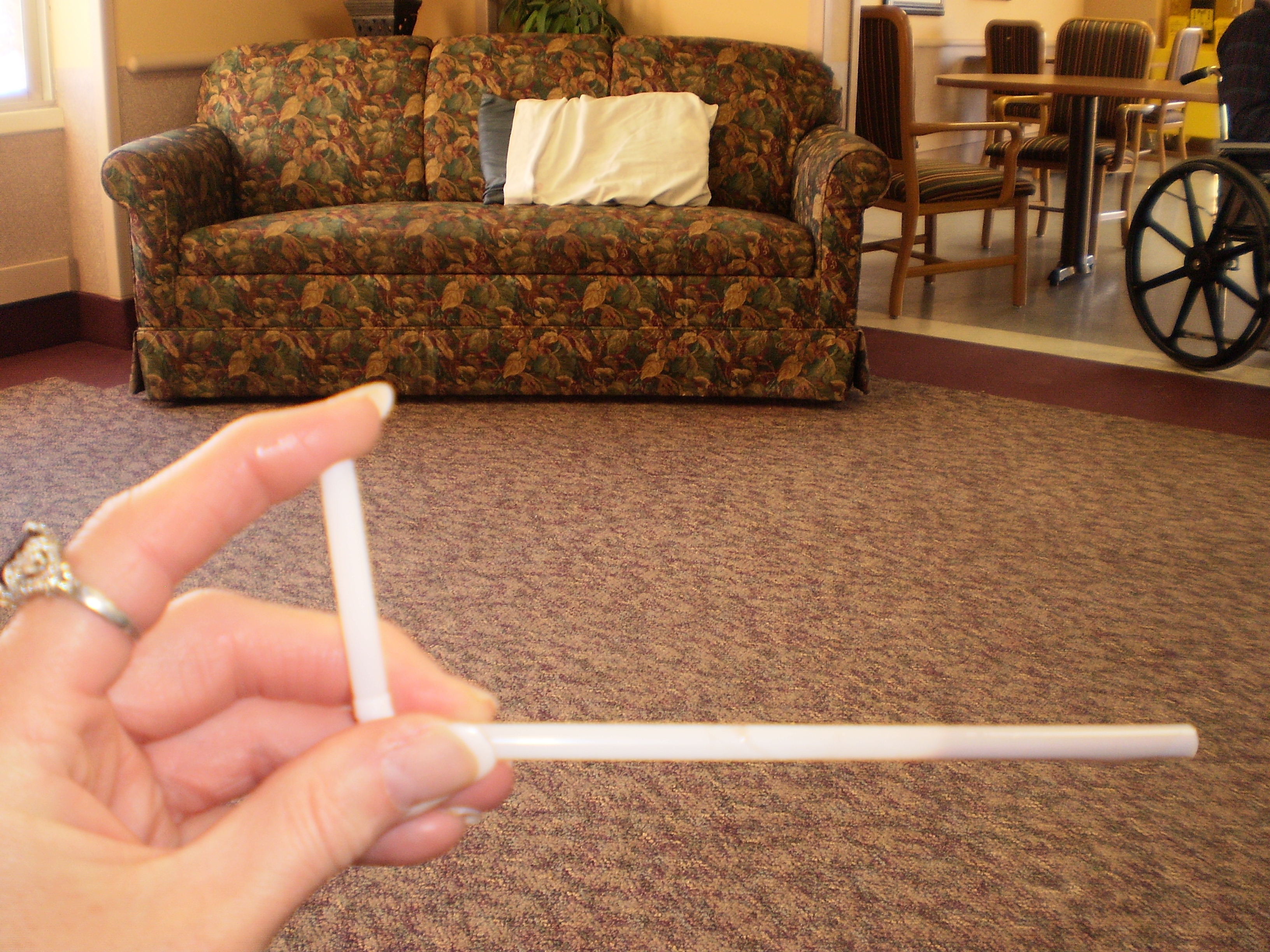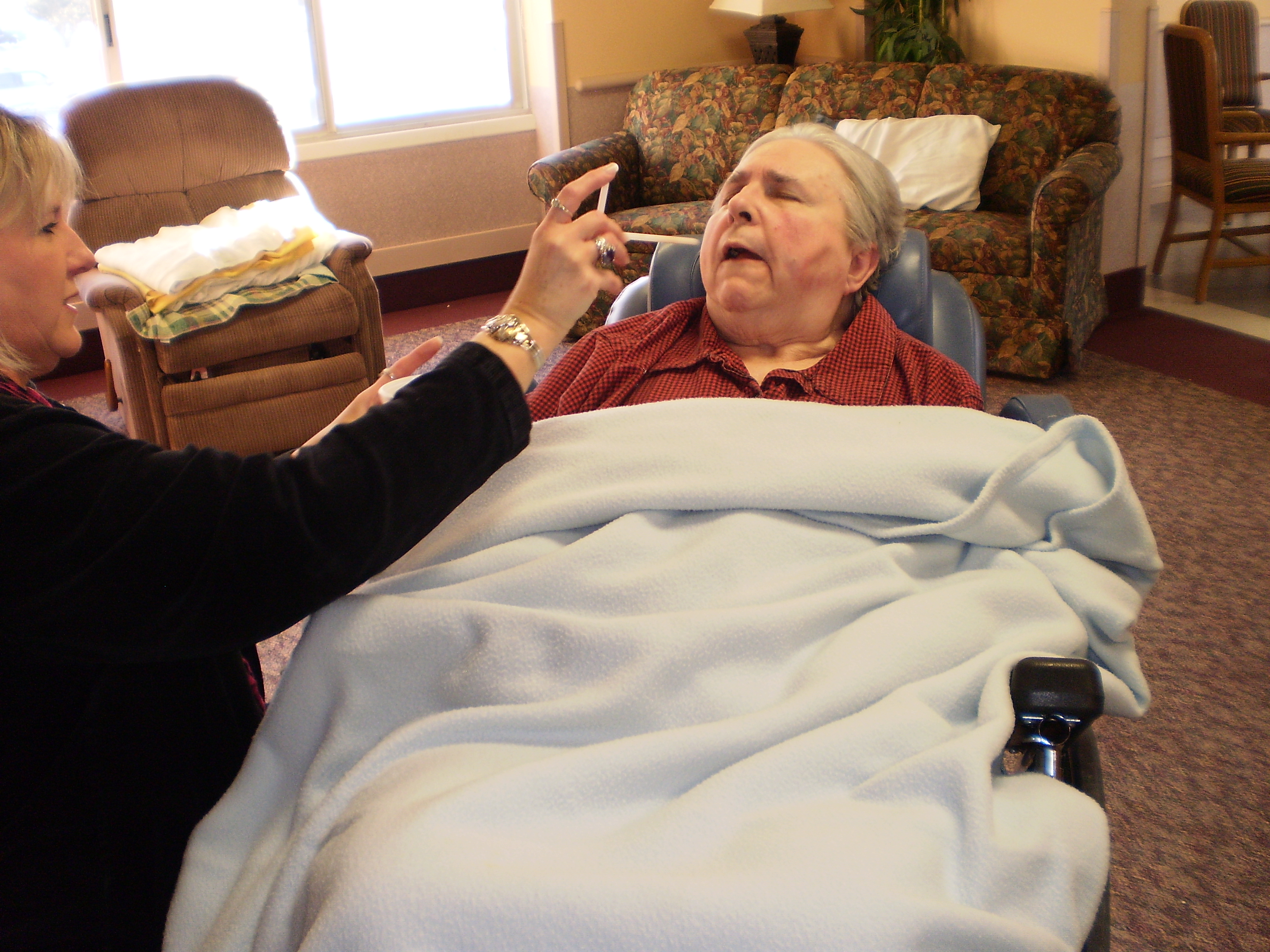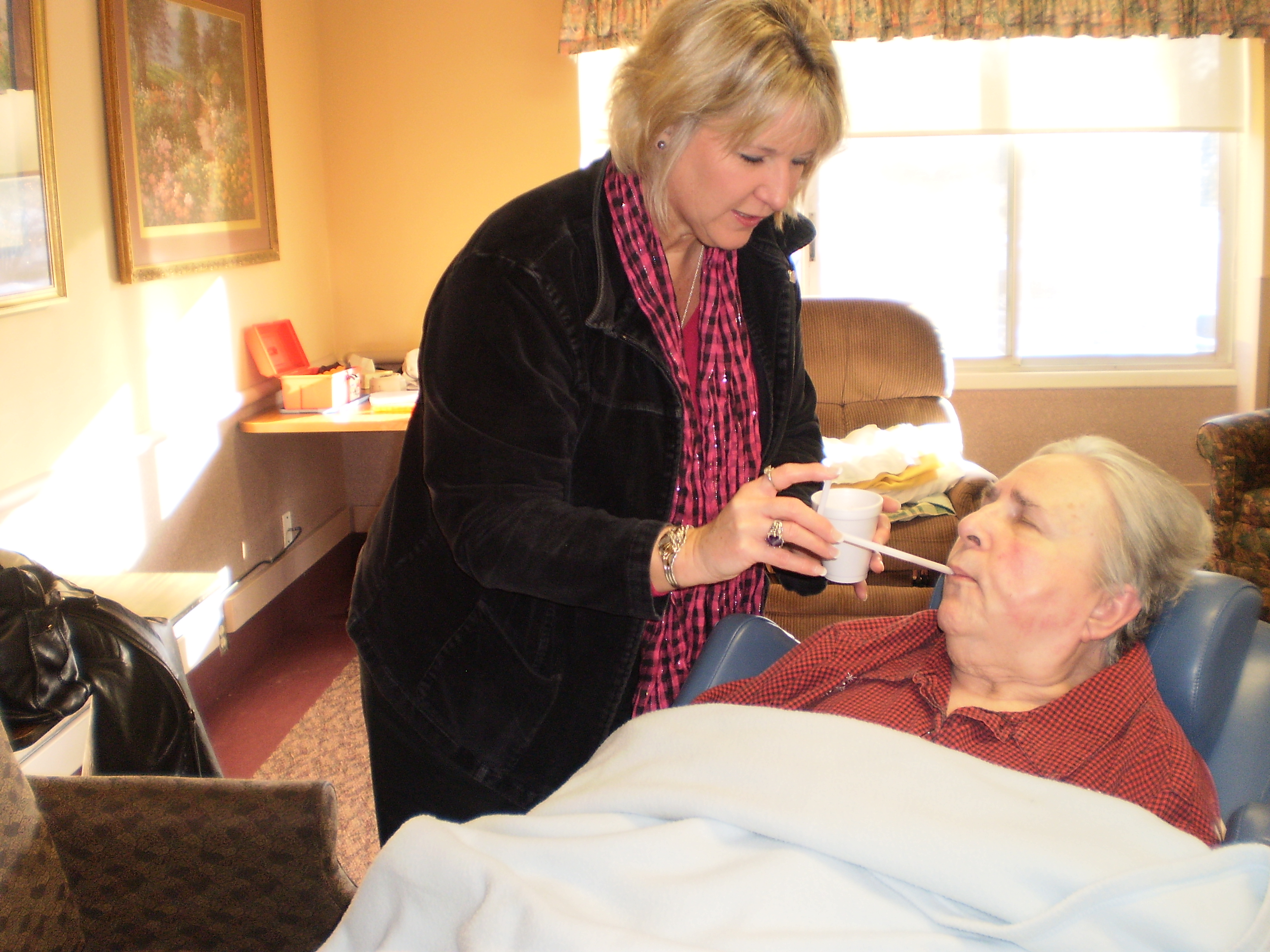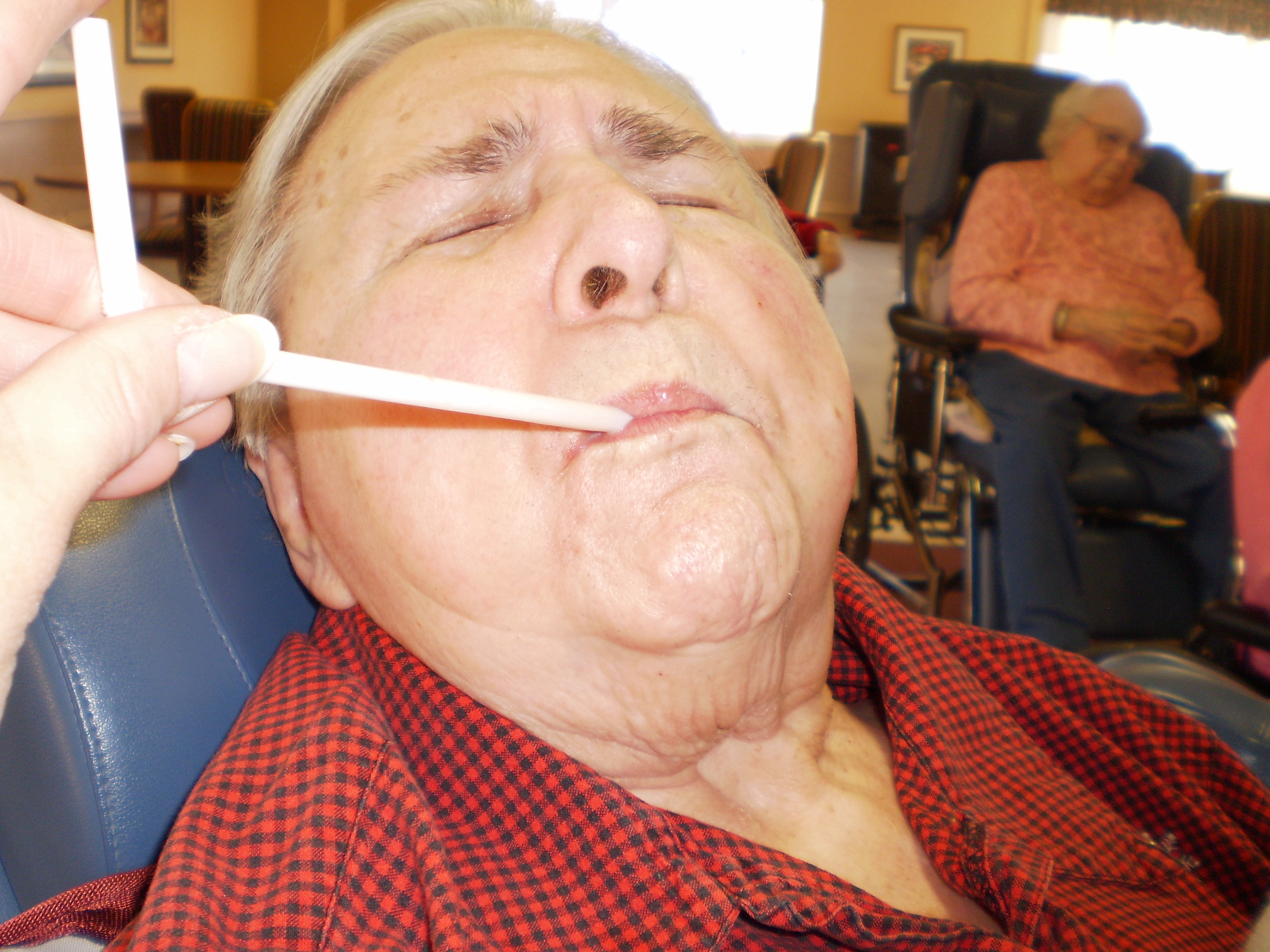Alzheimer’s – Feeding Tips for End Stages or Nonresponsives
Alzheimer’s – Feeding Tips for End Stages or Nonresponsives
By Lori La Bey of Alzheimer’s Speaks and Senior Lifestyle Trends
My Mom, in her end stages of Alzheimer’s disease now has trouble sipping or sucking to get her fluid intake at times. This doesn’t happen all the time but when it does I have learned one of the easiest ways to get liquids in her is to use a straw a kind of eye dropper. I use an adjustable straw as seen in the photo below. Here are pictures of Mom and I using this technique:
- Dip the straw in the liquid
- Put your finger over the short angled end or the straw to hold the liquid in the straw
- Bring the straw up to the persons mouth
- Announce that you have ________ liquid for them and ask them to open their mouth
- Gently touch their lips if they don’t open their mouth. The person will usually pop open their lips if interested or they will let you slip the straw between their lips.
- If they purse their lips and tightened up so you can’t get the straw in their mouth, then are not interested.
This is a simple and an effective method to get fluids into a person’s mouth. Most people will find time will pass faster, when you have a purpose and are engaged with the person.
If you don’t have a specific fluid you are trying to get in them, but want to moisten their mouth, you can feed them tiny ice chips. It is best to use a small spoon with 1 -3 little ice chucks, like those used on an snow cone. This works very well for someone who breathes through their mouth and their mouth gets dry, or someone who is in their end stages and can’t tolerate much intake and you are just trying to keep them comfortable. A dry mouth and throat can be an irritant for them. Giving small manageable amount of ice is minimal work for them. The small ice chips melt in their mouth moistening the mouth with little to no effort on their part. Again announce what you are doing prior to putting the spoon to their lips. If they don’t pop open their mouth try gently rubbing the spoon on their bottom lip like you would do when feeding a baby. Usually they will than pop open their mouth like a baby bird for you.







As a certified and licensed Speech-Language Pathologist with over 25 years experience, I wanted to offer some additional advice on offering liquids to end stage Alzheimer’s patients. First, does this person have a swallowing disorder? It is important to note if the individual is receiving regular thin liquids or is this person on thickened liquids-nectar or honey level? If using a straw to present thin liquids and the individual is in a reclining position, it is important to place the liquid toward the front of the mouth to decrease the risk for aspiration. By placing the liquid in the front, it allows the person more time to prepare for a swallow, again reducing the risk for aspiration.
If their lips or mouth are dry or you can try moistening with a lemon glycerin swab, washcloth, or tooth care sponge. It’s always important to try and maintain good oral care. This also helps maintain moisture as well.
It’s important, as you noted to always let the individual know you are there and what you plan to do. Maintaining someone’s dignity, even in the end stage of Alzheimer’s Disease is crucial.
Wonderful comments! Thanks for contributing. Your points are valued and I appreciate you taking the time to write. If you are ever interested in submitting guest articles please let me know. I would love to hear more from you and I’m sure our readers would be to. Hope you have a great holiday.
Lori
Lori,
I’ll be happy to submit guest articles. Are there specific topics of interest to you? Cognition, memory, healthy living tips, tips to decrease risk for developing Alz or dementia, swallowing, etc???
I also have some articles I’ve posted on my blog- http://brainmasters.wordpress.com
that you are certainly welcome to repost!
Happy Holidays!
Heidi
HI Heidi
I’m open to most anything that will help people dealing with Alzheimer’s disease. Send articles anytime. Also if you have others you would like to send in a wrod doc or pdf format we can add those int he great read sections under articles.
Hope you are enjoying your holiday.
Lori
hello I was luck to approach your blog in bing
your subject is splendid
I obtain much in your Topics really thanks very much
btw the theme of you website is really splendid
where can find it
Thanks
Lori
Great ideas and comments! We did the swab as well with my senior dad when he was in the end stage of his Parkinson’s Disease. We also used tiny medicine droppers to drip the water easily. I’ve also used that for grandchildren when they’ve had the flu and we were monitoring to be sure they didn’t get dehydrated.
HI Kaye
Thanks for taking the time to write. It is always good to hear what others have done or are trying. Lord knows none of us has all the answers!
Lori
I couldn’t agree with you more, anyway l love your site layout. Is nice and clean.
Thanks for stopping by. I hope to hear from you again!
Lori
The tip on using a straw to trap liquid is great. I will try it. However, I’m a bit concerned at the photos of the person laying back while being given fluids. I have always been told that is a choking risk. My Mom is in the late stages but she is always sitting up as straight as possible when being fed or receiving fluids. Just a thought. Thanks for the info.
Hi Mandy
Thanks for writing and asking such a great question. This is actually a picture of me with my Mother. I don’t believe there is a risk of choking with her as the amount of liquid is minimal and controlled by me, which is her watching closely. I could however see that becoming an issue if someone was not watching closely and knowing the person they are feeding. Thank you for being up a great point!
Lori
Another Speech-Language Pathologist (SLP) chiming in here. While I echo what the other SLP said, I want to emphasize the importance of upright posture while eating or drinking because of a person’s increased risk of aspiration–food or drink “going down the wrong way” to a person’s lungs. It is also important for a person to be alert and interested, as yiu said in the article, and not force or surprise the person. For more information on swallowing, cognition, and other areas of practice for SLPs, p, ease visit asha.org the American Speech-Language-Hearing Association.
Thank you for your information and insight Jean!
Lori
So glad I found this article. My mother does not have alzheimer’s but she is in the end stages of cancer. She asks for water and orange juice but is unable to suck from a straw.
I’m glad you found the article helpful. You still need to be careful when hydrating a person this way. You need to do it very slowly to make sure the fluid is going down.